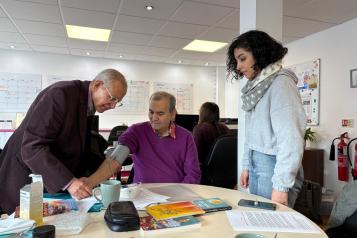Supporting emotional health among people living with long term conditions

For people with multiple long-term conditions the chances of having poor mental health are greater still. Yet people with long-term physical conditions still face many barriers to accessing mental health support.
Ask How I Am, produced by Centre for Mental Health and National Voices, is based on interviews with people living with a wide range of long-term physical conditions, including diabetes, arthritis, cancer and heart disease, and looks at the part that the Covid-19 pandemic has played in adding yet more pressure to people’s mental health. Once again, people and communities with the least resources and greatest adversities have seen the biggest impacts on their mental and physical health.
The report finds that people with long-term conditions have too few opportunities to ask for help with their mental health. Short appointments, over-stretched services and stigma all make it hard for people to say they are struggling.
As a result of this report, National Voices and Centre for Mental Health have launched a campaign, #AskHowIAm, calling for a greater focus on compassionate care for people with long-term conditions. We’ve brought together some top tips for practitioners on what this can look like:
- Ask patients how they are at every opportunity. Sometimes people just want to be asked how they are feeling. Creating a space for them to express how they are feeling can be a vital first step to getting the right support.
- Be aware of what help is available to people using your service for their emotional health.
- Give information and advice to help people to manage their condition, and be available when people need help with this.
- Reassure people that it’s okay to seek emotional support at any time while living with a long-term condition.
- Show compassion: small gestures of care can help people who are struggling with their mental or physical health.
- Challenge inequality: be aware that for people from marginalised and excluded communities there are additional barriers to support and low levels of trust that need to be rebuilt.
Find out more:


